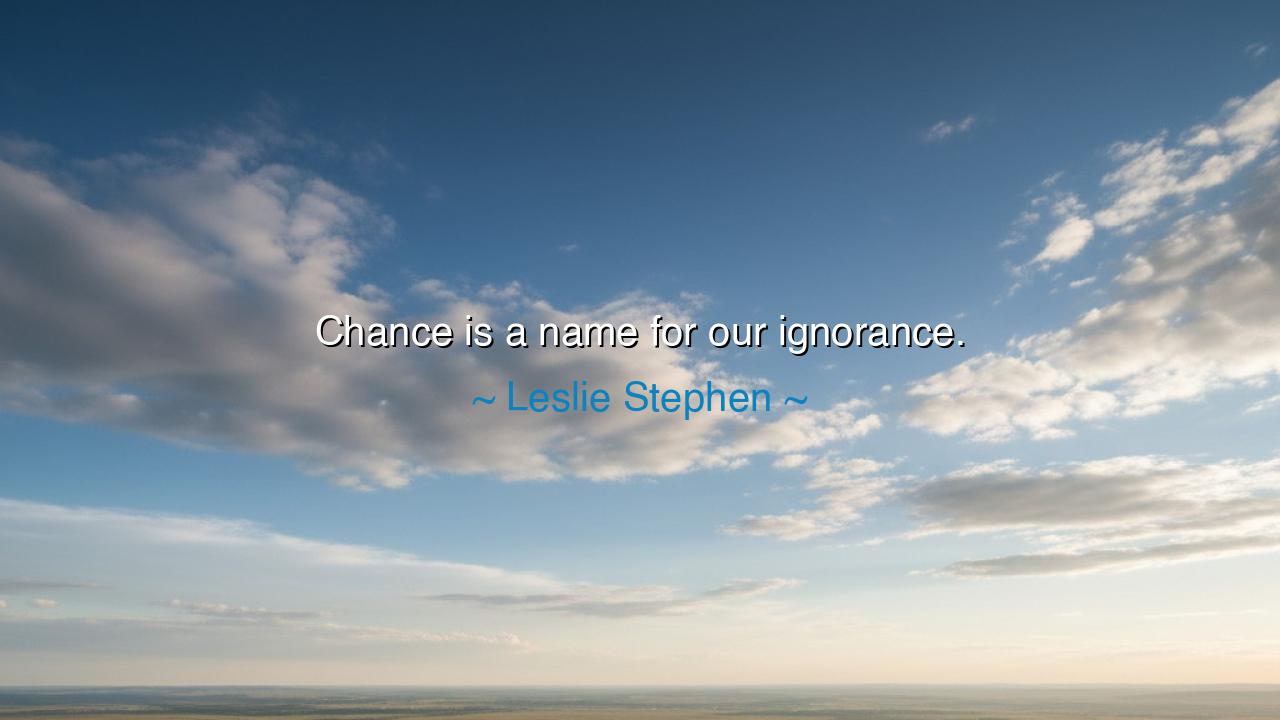
Chance is a name for our ignorance.






In the vast and mysterious expanse of existence, we often find ourselves seeking patterns and explanations for the events that unfold before us. Yet, there are moments when we encounter forces so unpredictable, so chaotic, that we attribute them to the whims of chance. But Leslie Stephen, a man of deep thought and reflection, once proclaimed, "Chance is a name for our ignorance." This profound statement invites us to ponder the nature of fate, coincidence, and the role of uncertainty in our lives. It suggests that what we call chance is merely a label for that which we do not understand, a reflection of our own limited knowledge and inability to comprehend the intricate workings of the universe.
The ancient philosophers, with their deep contemplations on fate and destiny, often wrestled with the question of whether the events of life are shaped by unseen forces or whether they arise from a simple chain of causal events. Heraclitus, the philosopher of change, believed that the universe was governed by a logos, a rational principle that underlies all things, even if it is beyond human comprehension. He rejected the idea that events occur by chance, for he saw all things as interconnected and subject to the flow of the cosmos. In the same way, Leslie Stephen’s assertion invites us to consider that when we speak of chance, we are merely acknowledging our inability to grasp the deeper truths that govern the world around us.
Consider the tale of Isaac Newton, the great mathematician and physicist, who, in his study of the universe, began to uncover the laws of motion and gravity that shape the very fabric of reality. For centuries, events such as the falling of an apple from a tree might have been attributed to chance, an unexplained whim of nature. Yet, Newton’s keen mind saw through this ignorance and discovered the natural laws that governed such events. To him, the apple’s fall was not a random occurrence but a consequence of the forces that govern the universe. Newton's work is a testament to how what we call chance often arises from ignorance—a failure to understand the deeper principles that drive the cosmos.
In the ancient world, many believed that the gods controlled the fate of mortals, casting their destinies by chance or whim. Oedipus, the tragic hero of Greek myth, fell victim to the gods' decree, unable to escape the fate that had been prophesied for him. Yet, as the myth unfolds, we come to see that his tragic fate was not mere chance, but the result of actions set into motion by human choices and divine will. The ancient tragedians, like Sophocles, understood that what we perceive as chance is often the unfolding of a larger, unknowable order—one that we may not fully understand. The gods, in their wisdom, showed that even what appears random is intricately woven into the fabric of existence.
In our own lives, how often do we encounter moments that seem random, as if the world is playing a game of chance with our destinies? Yet, when we look closely, we often see the subtle forces at play—choices we made, events we set in motion, and larger patterns that were invisible at the time. Take, for example, the life of Albert Einstein, whose groundbreaking work in physics was built on the exploration of principles that most of his contemporaries could not yet comprehend. Einstein’s theories, which once seemed like chance encounters with truth, later revealed themselves to be the result of his dedication and profound understanding of the universe. He saw the unseen forces that governed reality, and in his genius, he uncovered what others might have dismissed as mere coincidence.
The lesson that Leslie Stephen offers us is one of humility and awareness. When we speak of chance, we must recognize that it is often a reflection of our ignorance—our inability to see the connections that bind the universe together. What we call random is often the manifestation of deeper forces—the natural laws, the choices of others, and the currents of fate that shape our lives. Instead of attributing events to chance, we are called to seek understanding and to deepen our knowledge of the patterns that guide us.
Thus, dear seeker of truth, let Stephen's words guide you. In moments of uncertainty, resist the temptation to accept chance as the answer. Instead, look for the connections, the unseen forces, the deeper truths that shape the course of events. In every random encounter, in every seeming coincidence, there may lie a lesson—one that calls us to deepen our understanding and embrace the wisdom of the universe. The path forward lies not in surrendering to chance, but in seeking knowledge, for it is through understanding that we unravel the mysteries of life and move closer to the true meaning of our existence.






AAdministratorAdministrator
Welcome, honored guests. Please leave a comment, we will respond soon